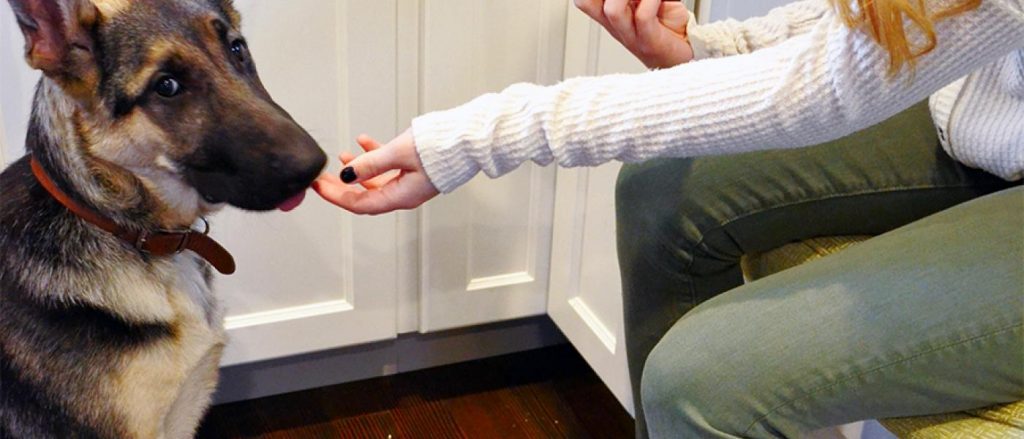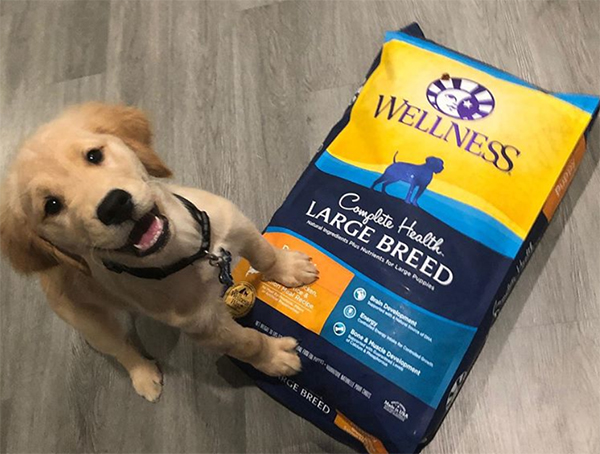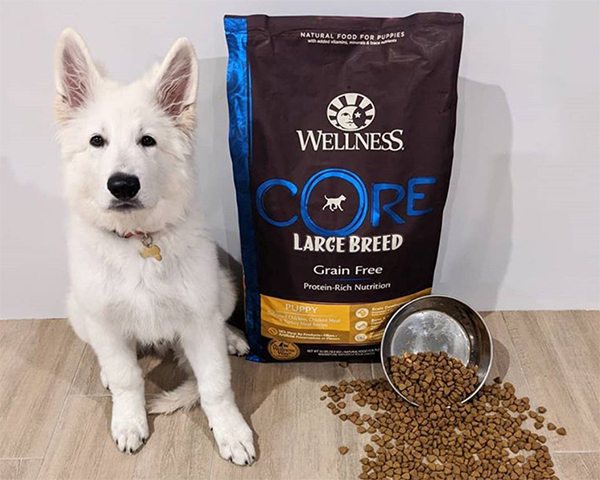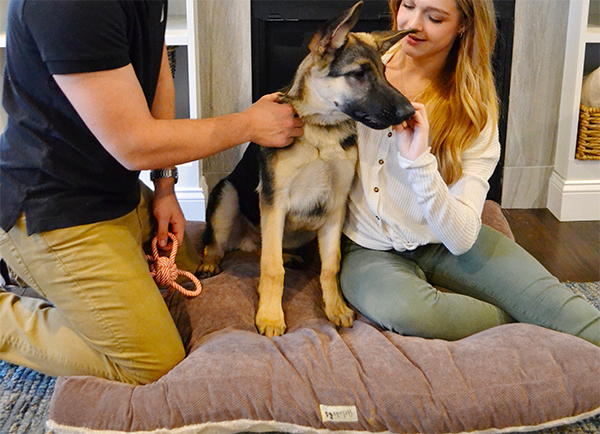A Guide to Feeding Large Breed Puppies as They Grow

If you recently adopted a large breed puppy, get ready for a wonderful rollercoaster fun ride as your rambunctious new family member discovers different things with boundless energy and delight. In terms of nutrition, puppyhood is an important life stage to ensure the puppy grows up to be a healthy and happy adult dog. And the best way to give him a great start in life is with a diet that specifically addresses large-breed puppies.
What is considered a large breed puppy?
Although there is some minor variation, most veterinarians and pet nutritionists consider a puppy a large breed if they’ll be 55-100 lbs when fully grown. If a puppy will weigh over 100 lbs when fully grown they are considered a giant breed (think Great Danes and Newfoundlands). The Association of American Feed Control Officials (AAFCO) defines a large breed dog as any dog that weighs over 70 lbs when fully grown.
What is different about large breed puppy food?
The main difference is that large breed puppy food has less calories as compared to regular puppy food.
This is because larger breeds are not considered adult dogs until they are 18-24 months old, explains pet nutritionist Mark Finke, PhD.
“The goal is to allow the connective tissue, muscle and bones to grow in proportion with the rest of the puppy.” Finke cautions that “puppy fat” is a misnomer. “Puppy fat is not always cute because in terms of your puppy’s overall health, if they put on too much fat, they are putting extra stress on developing joints and bones which can be detrimental in the long term.” This means that the best way to help your large breed puppy grow into a healthy adult is to feed them a diet that will help them grow more slowly over a longer period of time.
What are some recommended large breed puppy foods?
Puppies usually start to eat some solid food as a supplement to their mother’s milk when they are about four weeks old. By the time they are fully weaned and ready to be adopted at around eight weeks of age.
Once a puppy is around 8 weeks old, we recommend starting your large breed puppy on a high-quality, natural diet that’s specifically formulated to meet their unique nutritional needs.
- One great option is the Wellness CORE Large Breed Puppy Deboned Chicken, Chicken and Turkey Meal dry food recipe. It includes DHA from salmon oil to support healthy brain development, and guaranteed levels of calcium and phosphorus for bone, tooth and muscle development. The diet is fortified with vitamins and minerals to support a healthy immune system and is high in protein to ensure your large breed puppy has everything it needs to thrive.
- Another good option for your large breed puppy is Wellness Large Breed Complete Health Puppy Deboned Chicken, Brown Rice & Salmon Meal dry food recipe.

@cody_charlie_zack about to enjoy Wellness Complete Health Large Breed Puppy dry food.

@kuzcosnewgroove loves his Wellness CORE Large Breed Puppy dry food!
Both our CORE and Complete Health Large Breed Puppy recipes are formulated by taking into consideration the longer growth period of large breed puppies.
According to Finke, a well-balanced diet includes the vitamins and minerals a growing puppy needs, so there is no need to add supplements.
“In fact, doing so can be harmful,” warns Finke. “Giving a puppy too much calcium can interfere with the absorption of other important nutrients such as zinc and copper and could actually cause a nutritional deficiency. Copper is important for cartilage growth and zinc for bone formation,” he explains.
Feeding your large breed puppy the right amounts
When it comes to a feeding regimen, never just fill a food bowl and let a puppy graze. Instead, start your puppy off right by introducing a schedule of controlled feeding amounts as detailed in the feeding guidelines on the packaging. “The recommended feeding guide on the bag asks questions such as how old is your puppy and how heavy is your puppy in order to gauge feeding amount. It’s a good idea to re-check every two months,” suggests Wellness veterinarian Dr. Danielle Bernal. “It’s a guideline, and every dog is different. Use your eye— if you think your puppy is gaining too much weight, reduce the amount by 10 percent.”
“It’s important to remember that even large breed puppies have quite small tummies. When they are as young as eight to 12 weeks, they tend to have bursts of energy and then flop and sleep. It’s okay to take the required feeding amount and initially divide it into three or four small meals. But by the time they are 12 weeks old, divide that amount into two meals per day,” advises Bernal.
When measuring food amounts always use a standard measuring cup to measure. Never grab any cup or mug in the kitchen as they usually hold different and arbitrary amounts. Also, be sure that it’s a level cup. Anything heaped is extra food and ultimately will cause a puppy (or an adult dog) to gain weight.
When should I switch my large breed puppy to an adult food?
Because large breed puppies have longer growing periods, they should remain on a puppy formula until they are at least 18 months old, and giant breeds until they are two years old. It’s a good idea to transition slowly over to the adult formula instead of going “cold turkey” from one recipe to another.
Choosing Between Wet And Dry Recipes
Whether you feed kibble, canned food or a combination of wet and dry food is a personal pet parent choice.“Do be careful, though, if you start by feeding wet food only,” warns Finke. “It may be difficult to transition a dog over to dry later. And whatever you decide, always ensure there is a large bowl or dog fountain offering fresh water.”
Finke suggests if you have more than one puppy or dog, to feed them at three to six feet apart and preferably block their view of one another.“This allows them both to eat comfortably and peacefully and will prevent any food aggression or competitive eating problems from developing,” he explains.
Choosing a large breed puppy formula can give your growing dog the best start in life and, feeding the right amounts now, and through adulthood, will ensure that as a beloved family member, he remains a healthy weight with boundless energy for endless fun and games.
Do you have a large breed puppy? Please share your photos with us by tagging #wellnesspetfood and @wellnesspetfood for a chance to be featured on our website or social pages!





